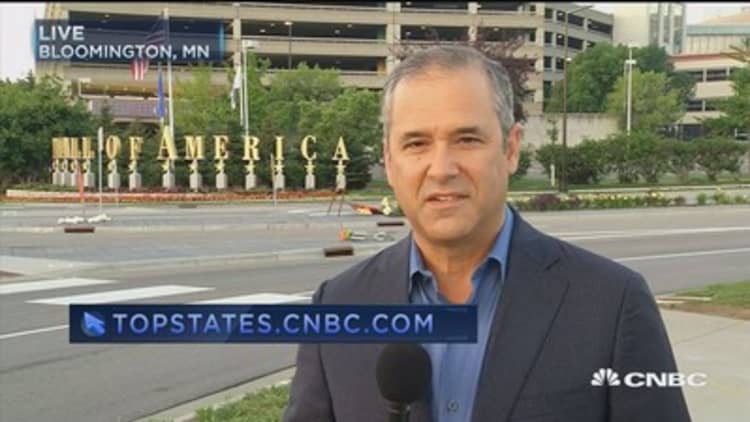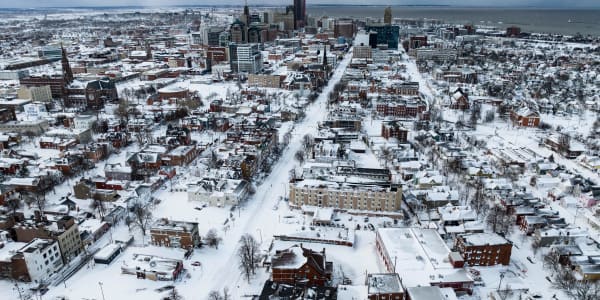
There is good news and bad news for Connecticut in this year's Top States study.
Let's start with the bad news, because it is familiar to anyone who has ever considered the Constitution State's business climate. Connecticut is expensive. Taxes and wages are high—the third-highest average hourly wage in the country, according to the Bureau of Labor Statistics, which the state taxes at a top rate of 6.7 percent. Electric bills are the third highest in the nation, according to the Department of Energy, and office rent—averaging nearly $25 a square foot, according to the CoStar Group—is the seventh highest. Roads and bridges are in bad shape, and the regulatory climate isn't much to write home about. But you knew all that. So how about the good news?
It turns out that Connecticut has some definite strengths, and those strengths play directly to what businesses are looking for most these days. That is why Connecticut jumps 13 spots in our rankings this year, tying with New Mexico for 2015's Most Improved State.
Remember, we're giving extra weight to our Workforce category in this year's methodology. That's because it is the selling point states are mentioning the most, as businesses clamor for skilled workers. Now we are singing Connecticut's tune.
Connecticut workers are among the most educated in the nation, according to the U.S. Census Bureau. Of state residents 25 and over, 37 percent have a college degree. Connecticut workers are also among the most productive in the nation, based on economic output per job. It doesn't hurt that Connecticut has a relatively small population at about 3.6 million people, with many working in high-output industries, like finance, insurance and business services. But that just speaks to the fact that the state is an economic and intellectual force.
Okay, back to reality—and back to the bad news. Yes, Connecticut improves 13 spots in our rankings, but that only means it ranks 33rd, up from a lowly 46th-place finish last year.
Read MoreState incentives: Business boon or corporate welfare?
A mainstay of the state economy, General Electric has been headquartered in Fairfield for more than 40 years but is threatening to move after lawmakers approved a $1.2 billion tax hike, much of it aimed at businesses. And a campaign by the state's business community to make Connecticut a top 20 state in our rankings by 2017 remains an uphill climb.
Land of growing enchantment
The other most improved state, New Mexico, makes its move, thanks to an improving job market. The state added about 14 thousand jobs in the past year, primarily in business services and health care. That is a healthy 1.8 percent job creation rate, according to the U.S. Department of Labor. It is a solid improvement from last year, when New Mexico's job growth was the worst in the nation. And it helped New Mexico move into a 24th-place tie (with Kansas) in Economy. It is not the best of finishes, but a whole lot better than 37th place a year ago.
New Mexico's improvement is built on shifting sands, however. The state economy relies heavily on oil and natural gas production in the Permian Basin, and energy prices are down about 40 percent from a year ago, when New Mexico was posting some of its largest economic gains.
How vulnerable is New Mexico to an oil shock? According to the American Petroleum Institute, if New Mexico were a country, it would rank 27th in the world for natural gas production and 33rd for oil production. Oil and gas severance taxes make up more than 18 percent of state revenues, according to the National Association of State Budget Officers.
Tarnished Silver State
You remember Nevada, don't you? The most improved state in 2014 seemed as if it was finally making a comeback from the devastating effects of the Great Recession that crippled the state's real estate market and sapped its important tourism industry. So when the state surged from 47th place in 2013 to 29th last year, we wrote this:
"Nevada's recovery is taking hold. On a percentage basis, the state trails only North Dakota for year-over-year job growth. And Nevada's housing market, battered so badly in the recession, is showing some real signs of life."
Read MoreTired of high taxes? Maybe it's time to move
What a difference a year makes. Nevada is more or less back where it started, at 45th place overall in 2015. What happened? It's the economy.
The state is still adding jobs at a healthy rate, but unemployment is the third highest in the nation, at 7 percent. Meanwhile, it turns out the housing market was simply pulling yet another head fake last year. The foreclosure rate, at 1.8 percent, is still twice the national average, according to RealtyTrac. Under our formula, which also considers housing starts, price appreciation and underwater mortgages, Nevada's housing market is stuck in the bottom tier. All told, Nevada's ranking for Economy slides back to 47th place from 21st a year ago, sealing the state's fate in our overall rankings.
Economic experiment
Other big declines include Kansas, which falls nine spots into that 24th place tie with New Mexico. What Gov. Sam Brownback had billed as a bold experiment in conservative economics in 2012—including big cuts in business taxes—went horribly awry, plunging the state into a full-blown budget crisis this year.
Brownback's $3.8 billion in tax cuts have yet to produce the economic growth he had hoped for, leaving the state to contend with a gaping $400 million budget hole, as well as threatened cuts in basic services, including education, prisons and social services.
In order to close the budget gap, Brownback and the state legislature ultimately agreed in June to a nearly 6 percent increase in the state sales tax—raising it to 6.5 percent from 6.15 percent—as well as an increase in the cigarette tax. Most of the business tax breaks remain in place, and proponents insist they will ultimately have the desired effect. But for now—and as far as our rankings are concerned—the results of Gov. Brownback's experiment are inconclusive.
The biggest loser
The biggest drop this year is Arizona, which plunges 21 spots to 34th place. The biggest factor is Arizona's economy, which declines to 36th place from 15th a year ago. While the state is still adding jobs, overall economic growth has slowed considerably. The state turned in a tepid 1.4 percent growth rate last year, among the lowest in its region, and about half the growth rate two years ago. That has exacerbated a $1 billion budget shortfall that necessitated painful cuts earlier this year.
Read MoreWorst state for business in 2015: Paradise lost
Add to that Arizona's perennial weaknesses, including one of the worst education systems in the nation, with the lowest per pupil spending, large class sizes and low test scores, and this was not the Grand Canyon State's year.
Still, University of Arizona Economist George Hammond, in an economic forecast issued June 1, sees some glimmers of hope. He expects job growth in Arizona to continue, with gains concentrated in the all-important service sector.
"Arizona is well positioned to continue to grow, assuming the nation avoids recession, and the state is also likely to continue to outpace the nation," he writes.
If so, we could see Arizona moving in the other direction in next year's rankings.






